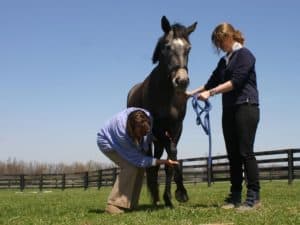Getting to the Bottom of Equine Lyme Neuroborreliosis
Equine Lyme disease in itself can be challenge for veterinarians to diagnose, not only because of its variable clinical signs, but also because not all “infected” animals develop disease. Even more challenging is Lyme neuroborreliosis (NB), which occurs when the causative agent—Borrelia burgdorferi—infects horses’ nervous tissue. Not every horse infected with B. burgdorferi will develop NB; many horses show no signs of disease; and, even if they do, there’s no reliable way to diagnose it.
So, in an attempt to better understand how to diagnose the condition, Laura Johnstone, BVSc, MVSc, of the University of Pennsylvania’s School of Veterinary Medicine at New Bolton Center, lead a team of researchers to review the clinical signs and pathologic findings from horses diagnosed at necropsy with NB.
The team reviewed medical records from 16 horses examined at three northeast veterinary teaching hospitals. They found that affected horses exhibited a variety of clinical signs including weight loss, loss of coordination, muscle twitches, muscle atrophy (wasting), stiff neck, uveitis (a form of eye inflammation), fever, joint effusion (swelling), cardiac arrhythmia, respiratory distress, and difficulty swallowing.
Post-mortem microscopic examination of nervous and other tissues revealed lesions that were unique to NB, differentiating it from other known causes of neurologic disease in horses. And, interestingly, the team noted, the lesions described in horses were consistent with those reported in humans with NB
Create a free account with TheHorse.com to view this content.
TheHorse.com is home to thousands of free articles about horse health care. In order to access some of our exclusive free content, you must be signed into TheHorse.com.
Start your free account today!
Already have an account?
and continue reading.
Written by:
Nettie Liburt, MS, PhD, PAS
Related Articles
Stay on top of the most recent Horse Health news with












